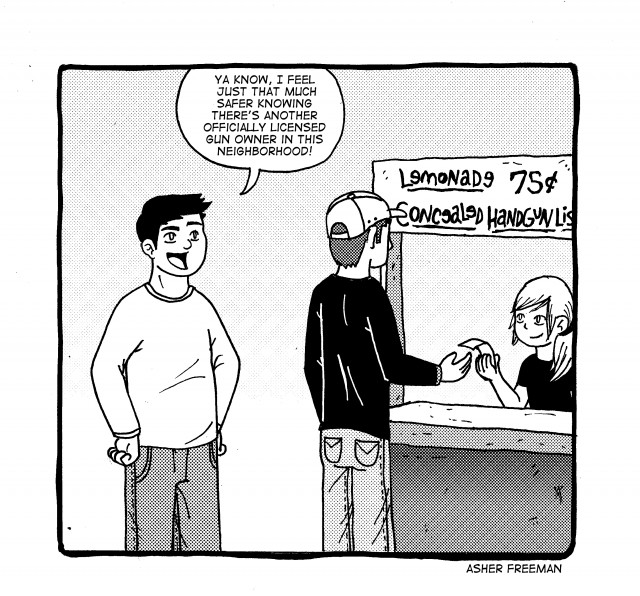 Before we begin, it must be stated that this is not a unanimously written editorial.
Before we begin, it must be stated that this is not a unanimously written editorial.
The Lariat editorial board, whose voice is supposed to be represented in this space, could not come to a unanimous decision on the issue of allowing concealed handguns on campus.
That is why it is the official position of the Lariat editorial board that Baylor University, through the Office of Institutional Research and Testing, should make it a priority to survey the campus to see where we all stand on the issue. It should then make those findings public as soon as possible and send them to area lawmakers.
So here is the position that the majority of the editorial board (which includes gun owners) agreed on — concealed handguns have no place on a college campus.
They don’t belong here any more than they belong in educational institutions or bars or liquor stores.
Those are places we have agreed as a state and a country are inappropriate places to carry a firearm.
A university campus is also one of those places. Universities are places of learning and of study.
They’re also places where, unfortunately, tragedies happen. The shooter in the tower at the University of Texas, the Virginia Tech massacre, the 2003 Dennehey murder that shut down Baylor basketball and other shooters have rocked campuses across the country.
That does not mean that more guns are the solution.
Imagine a Baylor with concealed handguns widely carried on campus. The faculty has them, the staff has them and students have them.
Now imagine a student is seen carrying a rifle on campus, between the Dutton Avenue Parking Garage to the Castellaw Communications Building. A well-meaning defender of the public draws down on him and fires. They perceive a threat and act without hesitation.
The police arrive and identify the student — a film student, a senior. They also identify the gun — a prop gun used in a project. If that seems far-fetched, you should know that this fall, a film student caused a stir while bringing a prop rifle from a WWII period piece back to his car.
The cry will invariably go up that concealed handgun license holders (CHLs) are responsible gun owners, that they have training, that they are trusted by society to fill that role.
Yes, absolutely. They have all of that, but let us look for a moment to the unfortunate case of Todd Canady last July.
He had a CHL and he was a “responsible gun owner” in Dallas. One day while reaching for his wallet, he heard an ear-splitting bang and felt a sharp pain in his leg. His handgun had gone off, injuring himself and three others, including a young child.
There is a fallacy in American logic when speaking about gun control. We assume that tragedies only happen when someone with severe mental troubles or a criminal record gets a gun. We assume that everyone who owns a gun is a “responsible gun owner” who can do no wrong with a firearm.
In fact, according to the Texas Department of Public Safety, 120 CHL holders were convicted of crimes in 2011. Compared to the more than 62,000 total arrests that’s not much, but people are slipping through the gaps.
Also, there are responsible people who own guns, but that does not mean that they are immune from accidents or pure human stupidity. They are fallible and the potential for mistakes exists.
But most people aren’t responsible. If you thought hard enough, you could name several people who are not responsible enough to carry a gun. They probably qualify to have a CHL or even have one.
But accidents are highly unlikely. So unlikely that it’s ridiculous to even think about, right?
In the past 10 years there have been 10 shootings on college campuses. Only two of those were considered mass shootings by the FBI. According to the Centers for Disease Control and Prevention, there were 613 accidental firearm fatalities in 2007 alone.
In short, an accidental discharge is a whole lot more likely than a mass shooting.
For CHL holders to be effective in a situation like a campus shooting, you must make snap decisions. You have to make the decision to take a life in a few milliseconds.
Police and members of the military are trained to act this quickly — to reduce dangerous situations to simple terms and address them. They also wear uniforms and serve the public interest. They should be commended for taking that awful burden for us, and we should not aspire to that in our everyday life.
The average citizen does not have the level of mental and technical training of sanctioned law enforcement officials. Furthermore, the idea that those without this training, but the ability and willingness to use deadly force move among us unmarked is terrifying.
The average person, lacking the mental training of police and army operatives, may waste precious time weighing the options in a deadly situation.
That makes them useless in the situations that require quick action against a shooter. But that’s not something to be ashamed of, in fact, it’s what makes humanity beautiful.
The inability to take a life without thinking is something to cultivate — that gentleness, that mercy, that courage is the very thing that our society needs.


